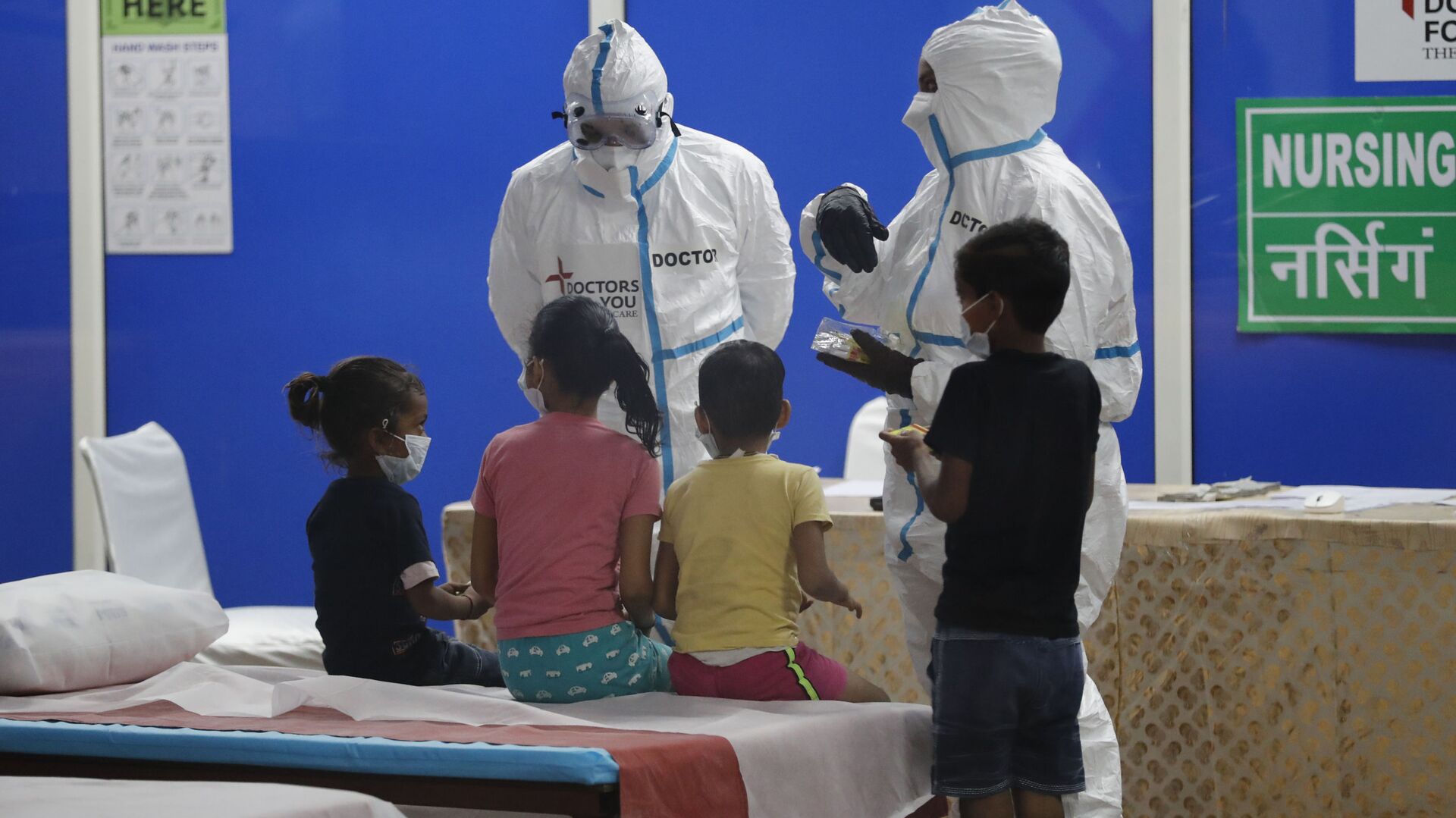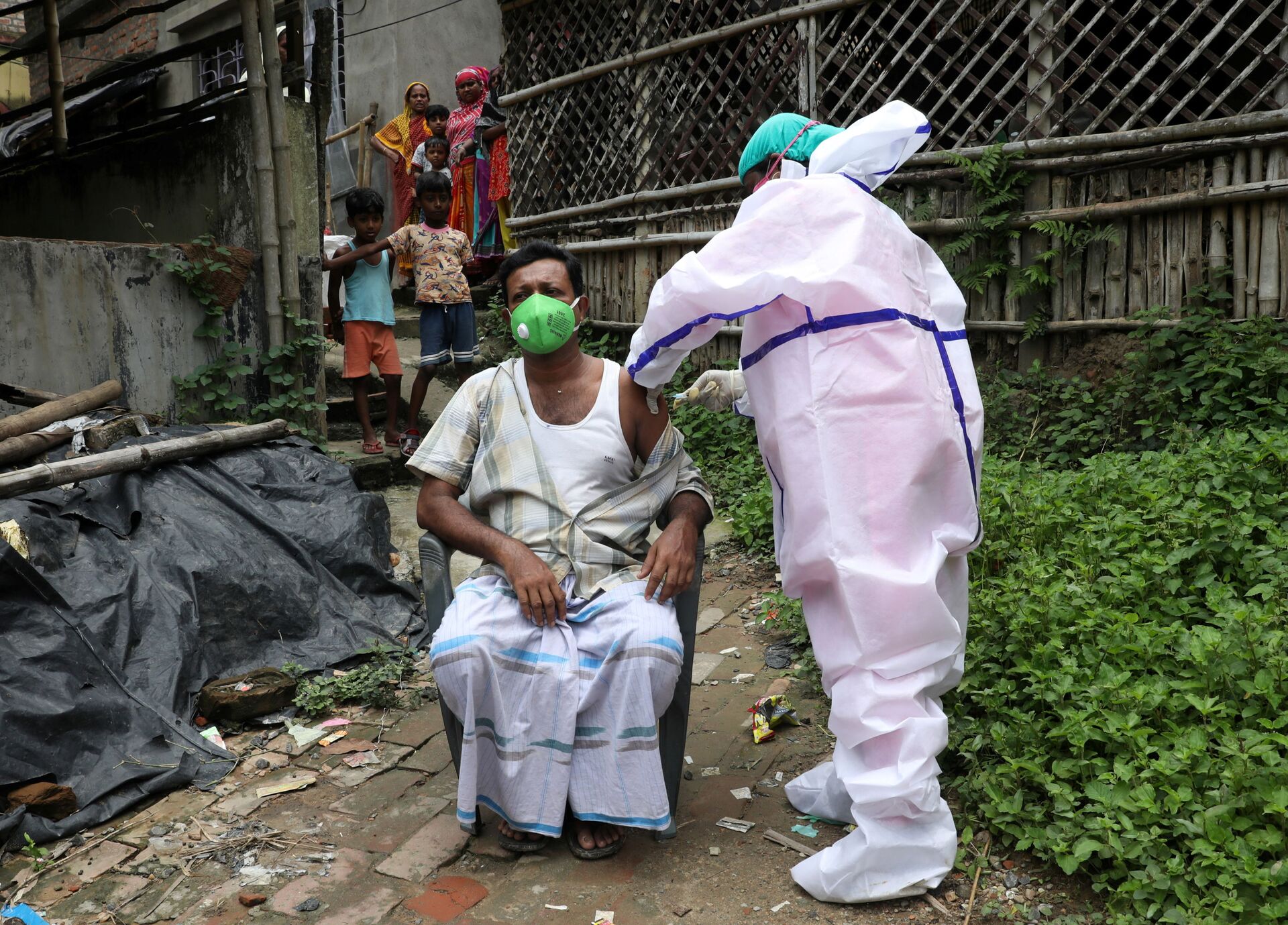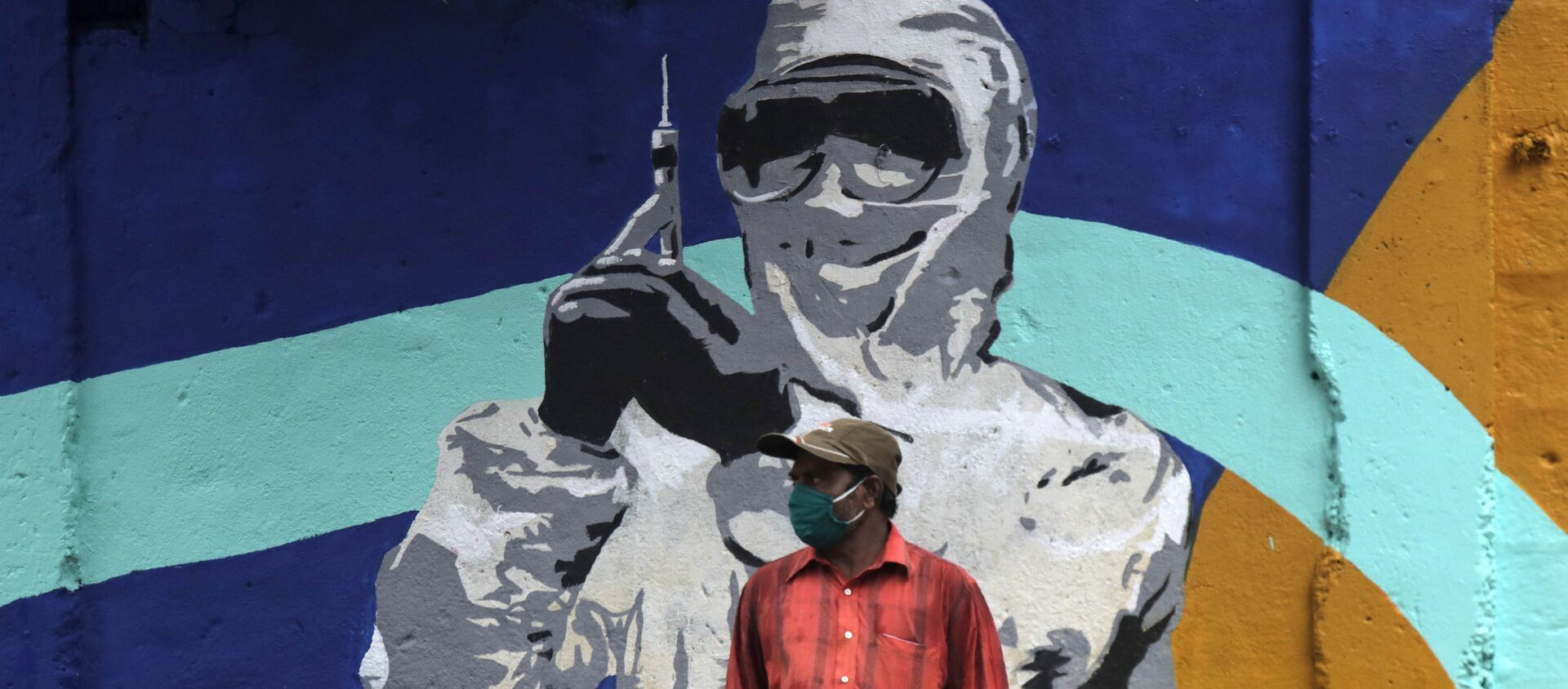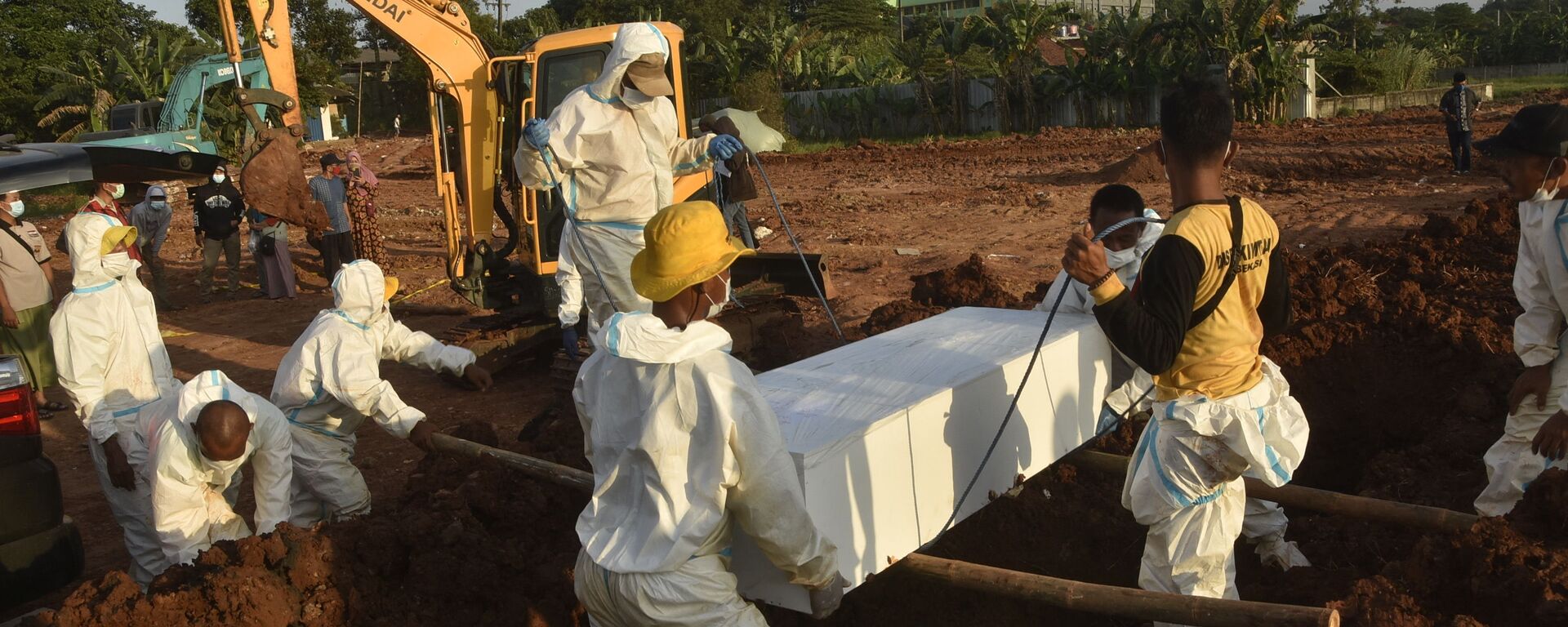https://sputnikglobe.com/20210925/indian-startup-owner-raghavendra-prasad-we-want-to-ensure-no-one-is-denied-access-to-healthcare-1089371760.html
Indian Startup Founder Raghavendra Prasad: 'We Want to Ensure No One is Denied Access to Healthcare'
Indian Startup Founder Raghavendra Prasad: 'We Want to Ensure No One is Denied Access to Healthcare'
Sputnik International
From raising funds to arranging resources like oxygen-related equipment and plasma donors during the devastating second wave of the coronavirus pandemic... 25.09.2021, Sputnik International
2021-09-25T11:09+0000
2021-09-25T11:09+0000
2021-09-27T06:05+0000
delhi
healthcare
coronavirus
covid-19
startup
https://cdn1.img.sputnikglobe.com/img/07e5/06/01/1083049210_0:180:3003:1869_1920x0_80_0_0_cb27d1c93761b77f9a276d5529589265.jpg
The ongoing coronavirus pandemic has deeply affected humankind, but it has also opened many doors of opportunity for a health-tech revolution in India. The constant demand during the pandemic has acted as a catalyst for health-tech startups that are ready to deploy their solutions on the ground.One such organisation is Project StepOne, a non-profit initiative that started in Delhi in March last year with 8,000 volunteers to provide ample care and help to COVID-19 infected people in India. Today, it has a volunteer base of 20,000 medics and citizens serving across 20 states and cities, conducting over a million teleconsultations daily in 33 languages.Founded by Raghavendra Prasad, Project StepOne has also been collaborating with over 20 state governments. Sputnik reached out to the founder of Project StepOne, Raghavendra Prasad, to discuss his organisation's mission. Sputnik: How does Project StepOne function? How has it made a difference in people's lives during the pandemic?Raghavendra Prasad: We have multiple interventions. First, public COVID helplines are set up by the government. What we have built is an Uber-like system in which people affected by COVID-19 get connected to doctors and other professionals who can help. We get all the data of the infected patients from the government on a regular basis. So, we individually call these people when they test positive and help them by understanding their symptoms and give them advice. Those who are in home isolation, we call them regularly. We do this in several Indian states. Another option is people calling these helpline numbers. These facilities vary from state to state. We also have a national helpdesk which we set up ourselves. Similarly, we have set up special helpline numbers for mental health issues in some states. All the COVID-related helpline numbers are publicised by the government or other agencies, and when people call these numbers, the calls are transferred to us and our volunteers help them.Sputnik: What inspired you to launch Project StepOne? How has your journey been so far? Raghavendra Prasad: Last year, when other parts of the world started to witness COVID cases and restrictions, we clearly knew India would get badly hit too. India has a massive population and we knew accessibility to proper healthcare would become an issue when cases would increase. Keeping all these factors in mind, we wanted to help. We never knew that we would transform into something so big. When we launched in March last year, thousands of volunteers signed up and we didn't expect this overwhelming response. The journey so far has been really good. When we as a not-for-profit organisation grew, it helped us in helping more people. To do something like this in a non-pandemic scenario generally takes a decade but we managed to achieve all of it within over a year. Sputnik: You have collaborated with India's state governments since the beginning of the pandemic. What have your focal areas been and how did this work out? Raghavendra Prasad: Our collaboration with the governments was mainly focused on helping them in helping the people. We are just volunteers and we don't take any money from the governments. We bring our technology to the table which can be combined with the existing technology and we can help the people. The surge in cases meant that governments would need help and they would be short-staffed. Initially, when we launched, there were not many cases and we noticed a pattern that people were calling these helpline numbers because of COVID panic. During that period, testing kits were also very few. So, we decided that we would get doctors to decide who got tested. We first went to the Karnataka state government. The head of the COVID war room told us they had everything and they didn't need anything. Then we showed them that the existing helpline is not working and even if the call gets through, the helpline executive doesn't properly help the caller. So, they agreed and allowed us to help and asked us to do this across the state. Soon, other state governments also asked us to provide a similar setup in their states. We continuously trained our volunteers for new opportunities like connecting plasma donors with recipients, long COVID-19, and during the second wave, we dealt with a lot of black fungus cases. We didn't limit ourselves. Sputnik: You deal with a lot of patient data. How do you make sure that their private data is protected? Raghavendra Prasad: Yes, it's an extremely important thing. Since we come from the corporate world, we are extremely sensitive about data protection. First and foremost is, we have built a system in a way that no data is stored and our doctors are able to see only the data of the patients they were dealing with at the moment. Even the back-end systems are encrypted and we have made sure it is hack-proof. We have taken utmost care in guarding the data. However, we have a long way to go as a country in prioritising data protection. Sputnik: The ongoing pandemic has highlighted the importance of advancement in the Indian healthcare sector. In your view, do these health-based startups contribute to boosting the country's healthcare sector? Raghavendra Prasad: Absolutely. Now, healthcare facilities can be availed with a few clicks and swipes and this has massively contributed to the increased accessibility rate. The pandemic has led to the accelerated implementation of a lot of legal frameworks, for instance, telemedicine. This led to the adoption of such facilities not just by the government, but also by private entities. The way the pandemic has influenced the growth of digital health has never been seen before and this will continue. Sputnik: The pandemic has also brought to light the wide gap between urban and rural India in in terms of access to basic healthcare. How can startups like Project StepOne help in bridging the gap? Raghavendra Prasad: The reason we kept everything on a simple phone call was that we wanted to be as inclusive as possible. We didn't want to put out an app or something more advanced which would exclude a section of the population that resides in rural India or is not tech-savvy. For us, there was no difference between urban or rural. We exist as a not-for-profit only to serve the underserved. Sputnik: What are the challenges that you and your startup have faced in your journey so far? Raghavendra Prasad: The foremost challenge when we started was "how do we get enough doctors to volunteer with us?" Another was how to keep them motivated and engaged, and in India volunteering is not a popular culture as compared to other countries. So, getting people to stay was a challenge. Another issue that we face is during government collaboration, as we don't get the response the way we want, which affects the volunteers too. For instance, a doctor identified someone who needs certain medicines urgently at home so we flagged the concern in the system. It's hard to know whether it was delivered or not. If we are not able to complete the loop, the doctor will lose hope in us too. The actual impact is the only source of motivation for the volunteers. Although we learned to work around it, this continues to be a challenge. We are present in multiple states, so our on-ground impact varies too. If one state is easier, then another state will be equally difficult. Initially, we were self-funding and clueless about how the money will come, but over the period, a few foundations have come forward to help us. Sputnik: How did Project StepOne act during the deadly second wave of the coronavirus pandemic? Raghavendra Prasad: After the COVID-19 cases went down last year, rumours began that COVID-19 was gone. Eventually, we stopped receiving funds, and later we got payments in February this year. We knew a second wave would come; however, due to the funding delay, we got little without preparation.The caseload went up to over 40,000 per day and we were only able to cater to about 12,000 cases. So, we had to level up ourselves four times more and we roped in medical interns and final year students too. This became large manpower and there were 15,000 of them, and they loved treating patients. We also invited corporate employees to volunteer for us and that worked well too. Frankly, what we witnessed in the second wave was unexpected as the country had run out of resources and infrastructure. In Delhi, we had a hard time as a lot of people used the shortage of resources like medicines, oxygen cylinders, and other necessities in the second wave as an opportunity. In some places, the government did a great job, like Bihar. They made sure that the shortages were taken care of. We had different experiences in different places. Delhi was our hardest. During the peak of the second wave, almost every day our volunteers used to cry or be depressed as their patients were dying. It was like an apocalypse. Sputnik: There are fears and confusion due to an impending third wave. How is your startup preparing for it? Raghavendra Prasad: In order to be all armed whenever the third wave comes, we first analysed the things that didn't work out in the second wave. We have initiated several ongoing projects and one of the strategies to postpone or delay the third wave is vaccination. We are counselling unvaccinated or hesitant people to get vaccinated and this is already happening in four states, and we are expanding in other states. We are training rural healthcare workers and paediatricians as there are speculations that children might be the most vulnerable in the third wave. We have already trained over 400 doctors in the first batch. Sputnik: When the pandemic began, the whole world made COVID-19 eradication their prime focus. However, many non-COVID ailments have been neglected. Is your start-up considering working with other diseases too? What are the future plans for Project StepOne? Raghavendra Prasad: Actually, we have started several projects related to women and child healthcare, but they are at a very nascent stage. Right now, the primary focus is on COVID-19 eradication. But yes, there are a lot of health ailments like diabetes, hypertension, among others that have been neglected. We will work on them soon and make a bigger impact. We have realised that using technology in public health enhances the impact. We want to take accessibility to public healthcare to the next level. We believe that a lot of what we are doing for COVID-19 is also applicable to other diseases. We hope that we will become a force that will take quality healthcare to each corner of the country and this will continue to be our mission. We want to make sure no person is denied access to quality healthcare.
https://sputnikglobe.com/20210616/self-medication-caused-second-wave-of-covid-19-to-turn-dangerous-in-india-says-pulmonary-expert-1083159342.html
https://sputnikglobe.com/20210923/indian-supreme-court-to-set-up-committee-to-investigate-pegasus-spyware-scandal-1089323820.html
https://sputnikglobe.com/20210715/who-covid-19-pandemic-enters-early-stages-of-third-wave-despite-growing-vaccination-rates-1083392641.html
delhi
Sputnik International
feedback@sputniknews.com
+74956456601
MIA „Rossiya Segodnya“
2021
Sushmita Panda
https://cdn1.img.sputnikglobe.com/img/07e5/05/12/1082926186_0:0:2048:2048_100x100_80_0_0_4474d0d7e27a36878eb8727832be74b4.jpg
Sushmita Panda
https://cdn1.img.sputnikglobe.com/img/07e5/05/12/1082926186_0:0:2048:2048_100x100_80_0_0_4474d0d7e27a36878eb8727832be74b4.jpg
News
en_EN
Sputnik International
feedback@sputniknews.com
+74956456601
MIA „Rossiya Segodnya“
Sputnik International
feedback@sputniknews.com
+74956456601
MIA „Rossiya Segodnya“
Sushmita Panda
https://cdn1.img.sputnikglobe.com/img/07e5/05/12/1082926186_0:0:2048:2048_100x100_80_0_0_4474d0d7e27a36878eb8727832be74b4.jpg
delhi, healthcare, coronavirus, covid-19, startup
delhi, healthcare, coronavirus, covid-19, startup
Indian Startup Founder Raghavendra Prasad: 'We Want to Ensure No One is Denied Access to Healthcare'
11:09 GMT 25.09.2021 (Updated: 06:05 GMT 27.09.2021) From raising funds to arranging resources like oxygen-related equipment and plasma donors during the devastating second wave of the coronavirus pandemic, Indian startups and their owners haven’t shied away from helping people in these tough times.
The ongoing coronavirus pandemic has deeply affected humankind, but it has also opened many doors of opportunity for a
health-tech revolution in India.
The constant demand during the pandemic has acted as a catalyst for health-tech startups that are ready to deploy their solutions on the ground.
One such organisation is Project StepOne, a non-profit initiative that started in Delhi in March last year with 8,000 volunteers to provide ample care and help to COVID-19 infected people in India.
Today, it has a volunteer base of 20,000 medics and citizens serving across 20 states and cities, conducting over a million
teleconsultations daily in 33 languages.
Founded by Raghavendra Prasad, Project StepOne has also been collaborating with over 20 state governments.
Sputnik reached out to the founder of Project StepOne, Raghavendra Prasad, to discuss his organisation's mission.
Sputnik: How does Project StepOne function? How has it made a difference in people's lives during the pandemic?
Raghavendra Prasad: We have multiple interventions. First, public COVID helplines are set up by the government. What we have built is an Uber-like system in which people affected by COVID-19 get connected to doctors and other professionals who can help.
We get all the data of the infected patients from the government on a regular basis. So, we individually call these people when they test positive and help them by understanding their symptoms and give them advice.
Those who are in home isolation, we call them regularly. We do this in several Indian states.
Another option is people calling these helpline numbers. These facilities vary from state to state. We also have a national helpdesk which we set up ourselves.
Similarly, we have set up special helpline numbers for mental health issues in some states. All the COVID-related helpline numbers are publicised by the government or other agencies, and when people call these numbers, the calls are transferred to us and our volunteers help them.
Sputnik: What inspired you to launch Project StepOne? How has your journey been so far?
Raghavendra Prasad: Last year, when other parts of the world started to witness COVID cases and restrictions, we clearly knew India would get badly hit too.
India has a massive population and we knew accessibility to proper healthcare would become an issue when cases would increase. Keeping all these factors in mind, we wanted to help. We never knew that we would transform into something so big.
When we launched in March last year, thousands of volunteers signed up and we didn't expect this overwhelming response. The journey so far has been really good.
When we as a not-for-profit organisation grew, it helped us in helping more people. To do something like this in a non-pandemic scenario generally takes a decade but we managed to achieve all of it within over a year.
Sputnik: You have collaborated with India's state governments since the beginning of the pandemic. What have your focal areas been and how did this work out?
Raghavendra Prasad: Our collaboration with the governments was mainly focused on helping them in helping the people. We are just volunteers and we don't take any money from the governments. We bring our technology to the table which can be combined with the existing technology and we can help the people.
The surge in cases meant that governments would need help and they would be short-staffed. Initially, when we launched, there were not many cases and we noticed a pattern that people were calling these helpline numbers because of COVID panic.
During that period, testing kits were also very few. So, we decided that we would get doctors to decide who got tested.
We first went to the Karnataka state government. The head of the
COVID war room told us they had everything and they didn't need anything. Then we showed them that the existing helpline is not working and even if the call gets through, the helpline executive doesn't properly help the caller.
So, they agreed and allowed us to help and asked us to do this across the state. Soon, other state governments also asked us to provide a similar setup in their states.
We continuously trained our volunteers for new opportunities like connecting plasma donors with recipients, long COVID-19, and during the second wave, we dealt with a lot of black fungus cases. We didn't limit ourselves.
Sputnik: You deal with a lot of patient data. How do you make sure that their private data is protected?
Raghavendra Prasad: Yes, it's an extremely important thing. Since we come from the corporate world, we are extremely sensitive about data protection.
First and foremost is, we have built a system in a way that no data is stored and our doctors are able to see only the data of the patients they were dealing with at the moment. Even the back-end systems are encrypted and we have made sure it is hack-proof.
We have taken utmost care in guarding the data. However, we have a long way to go as a country in prioritising data protection.

23 September 2021, 12:53 GMT
Sputnik: The ongoing pandemic has highlighted the importance of advancement in the Indian healthcare sector. In your view, do these health-based startups contribute to boosting the country's healthcare sector?
Raghavendra Prasad: Absolutely. Now, healthcare facilities can be availed with a few clicks and swipes and this has massively contributed to the increased accessibility rate.
The pandemic has led to the accelerated implementation of a lot of
legal frameworks, for instance, telemedicine. This led to the adoption of such facilities not just by the government, but also by private entities.
The way the pandemic has influenced the growth of digital health has never been seen before and this will continue.
Sputnik: The pandemic has also brought to light the wide gap between urban and rural India in in terms of access to basic healthcare. How can startups like Project StepOne help in bridging the gap?
Raghavendra Prasad: The reason we kept everything on a simple phone call was that we wanted to be as inclusive as possible. We didn't want to put out an app or something more advanced which would exclude a section of the population that resides in rural India or is not tech-savvy.
For us, there was no difference between urban or rural. We exist as a not-for-profit only to serve the underserved.
Sputnik: What are the challenges that you and your startup have faced in your journey so far?
Raghavendra Prasad: The foremost challenge when we started was "how do we get enough doctors to volunteer with us?" Another was how to keep them motivated and engaged, and in India volunteering is not a popular culture as compared to other countries.
So, getting people to stay was a challenge. Another issue that we face is during government collaboration, as we don't get the response the way we want, which affects the volunteers too.
For instance, a doctor identified someone who needs certain
medicines urgently at home so we flagged the concern in the system. It's hard to know whether it was delivered or not. If we are not able to complete the loop, the doctor will lose hope in us too.
The actual impact is the only source of motivation for the volunteers. Although we learned to work around it, this continues to be a challenge.
We are present in multiple states, so our on-ground impact varies too. If one state is easier, then another state will be equally difficult. Initially, we were self-funding and clueless about how the money will come, but over the period, a few foundations have come forward to help us.
Sputnik: How did Project StepOne act during the deadly second wave of the coronavirus pandemic?
Raghavendra Prasad: After the COVID-19 cases went down last year, rumours began that COVID-19 was gone. Eventually, we stopped receiving funds, and later we got payments in February this year. We knew a
second wave would come; however, due to the funding delay, we got little without preparation.
The caseload went up to over 40,000 per day and we were only able to cater to about 12,000 cases. So, we had to level up ourselves four times more and we roped in medical interns and final year students too. This became large manpower and there were 15,000 of them, and they loved treating patients.
We also invited corporate employees to volunteer for us and that worked well too. Frankly, what we witnessed in the second wave was unexpected as the country had run out of resources and infrastructure.
In Delhi, we had a hard time as a lot of people used the shortage of resources like medicines, oxygen cylinders, and other necessities in the second wave as an opportunity. In some places, the government did a great job, like Bihar. They made sure that the shortages were taken care of.
We had different experiences in different places. Delhi was our hardest. During the peak of the second wave, almost every day our volunteers used to cry or be depressed as their patients were dying. It was like an apocalypse.
Sputnik: There are fears and confusion due to an impending third wave. How is your startup preparing for it?
Raghavendra Prasad: In order to be all armed whenever the third wave comes, we first analysed the things that didn't work out in the second wave. We have initiated several ongoing projects and one of the strategies to postpone or delay the third wave is vaccination.
We are counselling unvaccinated or hesitant people to get vaccinated and this is already happening in four states, and we are expanding in other states.
We are training rural healthcare workers and paediatricians as there are speculations that children might be the most vulnerable in the third wave. We have already trained over 400 doctors in the first batch.
Sputnik: When the pandemic began, the whole world made COVID-19 eradication their prime focus. However, many non-COVID ailments have been neglected. Is your start-up considering working with other diseases too? What are the future plans for Project StepOne?
Raghavendra Prasad: Actually, we have started several projects related to women and child healthcare, but they are at a very nascent stage.
Right now, the primary focus is on COVID-19 eradication. But yes, there are a lot of health ailments like diabetes, hypertension, among others that have been neglected. We will work on them soon and make a bigger impact.
We have realised that using technology in public health enhances the impact. We want to take accessibility to public healthcare to the next level. We believe that a lot of what we are doing for COVID-19 is also applicable to other diseases.
We hope that we will become a force that will take quality healthcare to each corner of the country and this will continue to be our mission. We want to make sure no person is denied access to quality healthcare.






